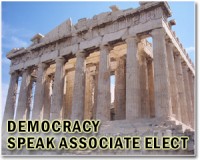| . |  |
. |
Beijing (AFP) Jan 31, 2011 Chinese censors are blocking online discussion and sanitising news reports about the unrest in Egypt, in a sign of official unease that the uprising could fuel calls for reform at home. Keyword searches on the protests returned no results Monday on microblogs and reader discussion of news reports about Egypt was disabled on major portals as China's pervasive censorship apparatus swung into full gear. News coverage of the demonstrations against the 30-year rule of Egyptian President Hosni Mubarak was limited to sparse accounts that largely glossed over the underlying political factors and calls for democracy. Coverage instead stressed Cairo's lawlessness and the need for order -- echoing calls by China's foreign ministry -- and the government's plan to send two chartered jets to Cairo to bring home more than 500 stranded Chinese. Photos from Egypt were conspicuously absent from major Chinese newspapers, while Monday's state news broadcast omitted footage of protests, instead showing Mubarak meeting top officials. "I would imagine the government put out some sort of order for all outlets to use only copy from (state-run news agency) Xinhua. That's the standard procedure," said Jeremy Goldkorn, editor of the Beijing-based China media website danwei.org, which also is blocked by censors. "That way they can sterilise the depiction of the situation or portray it as something negative or a product of Western influence." China actively censors content seen as a potential challenge to the legitimacy of the ruling Communist Party. China's leaders have faced mounting public discontent in recent years over political hot-button issues including persistent reports of abusive government officials, dangerous environmental damage and now surging inflation. China suppressed violent ethnic uprisings in Tibet and the mainly Muslim Xinjiang region of northwestern China in 2008 and 2009, while the Nobel Peace Prize won by dissident writer Liu Xiaobo in October also rattled Beijing. Coverage of Liu's honour was limited to government denunciations of the decision by the Oslo-based Nobel committee. Foreign TV coverage of the award ceremony in December was blacked out. Beijing's reaction to the Egypt situation recalls similar curbs put in place during the so-called "colour revolutions" in Eastern Europe a decade ago. The Global Times, a party-linked newspaper known for its nationalist views, ran an editorial Sunday headlined "Colour revolutions will not bring about real democracy," that warned of the chaos such revolts could trigger. "When it comes to political systems, the Western model is only one of a few options," it said. "It takes time and effort to apply democracy to different countries, and to do so without the turmoil of revolution." China's countless blogs and online discussion fora -- the main outlet for relatively free public expression -- appeared scrubbed of the subject. Searches on the blogs of major web portals returned an error message saying the topic was not allowed under "relevant laws". Keyword searches on sina.com's Twitter-like microblog service, the market leader with more than 50 million users, returned no results on the Egypt unrest on Monday. The explosive growth of microblogs in China has emerged as a new challenge for censors seeking to control public discussion. China blocked Twitter in 2009 -- after barring other high-profile foreign Internet services such as YouTube and Facebook -- after authorities said social-networking services were being used to fan the Xinjiang violence. However, several Chinese imitations have since filled the void and drawn an enthusiastic following from the country's 457 million Internet users. Users have seized on the platform as a new avenue for mass discourse but controversial issues remain blocked, either directly by the government or by providers hoping to avoid trouble from authorities.
Share This Article With Planet Earth
Related Links Democracy in the 21st century at TerraDaily.com
 Iraqis: Egypt, Tunisia inspired by Saddam's fall
Iraqis: Egypt, Tunisia inspired by Saddam's fallBaghdad (AFP) Jan 29, 2011 Iraqis on Saturday welcomed the revolt in Egypt that threatens to topple President Hosni Mubarak, with some claiming the tremors shaking Arab rulers had begun with the overthrow of Saddam Hussein. "Saddam was their teacher, and all of these dictators are his little pupils," declared Hussein Mohammed, taking a break from loading boxes of imported toys into a truck. "The dictator (Mubarak) ... read more |
|
| The content herein, unless otherwise known to be public domain, are Copyright 1995-2010 - SpaceDaily. AFP and UPI Wire Stories are copyright Agence France-Presse and United Press International. ESA Portal Reports are copyright European Space Agency. All NASA sourced material is public domain. Additional copyrights may apply in whole or part to other bona fide parties. Advertising does not imply endorsement,agreement or approval of any opinions, statements or information provided by SpaceDaily on any Web page published or hosted by SpaceDaily. Privacy Statement |